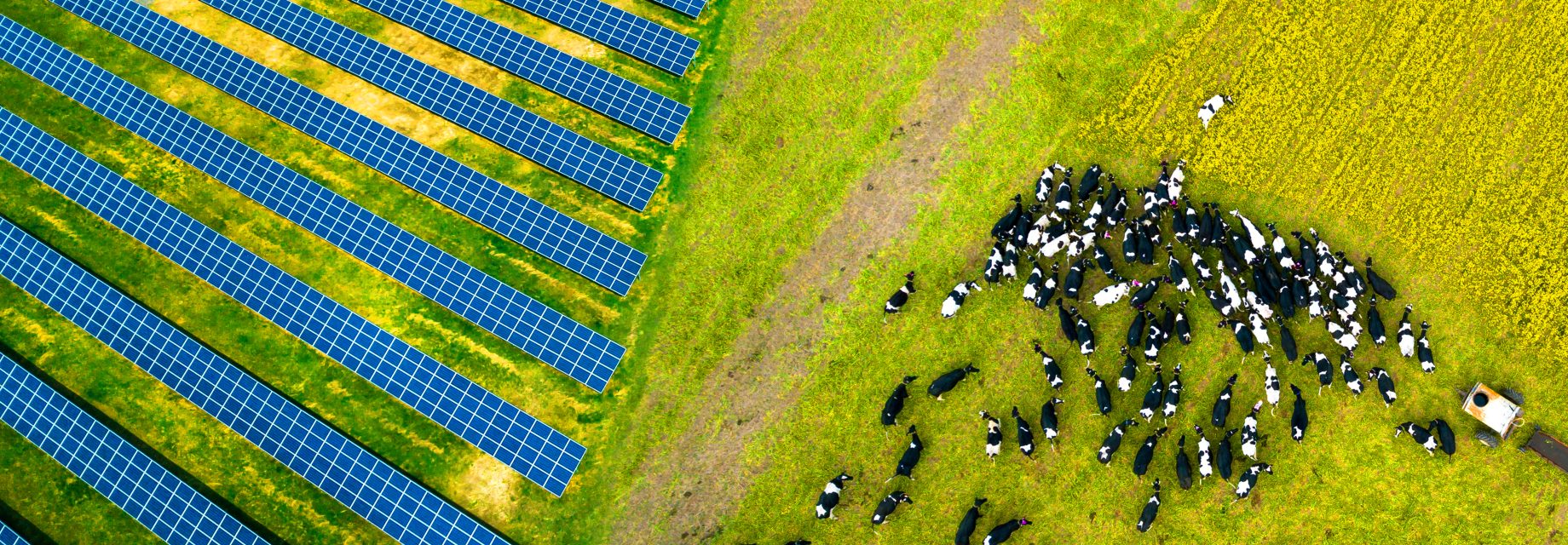Amid the evolving landscape of UK agriculture, a transformative shift is taking shape. A recent report from the private bank, Investec Wealth & Investment, sheds light on an emerging trend: a growing number of UK landowners are embracing renewable energy, with a marked focus on solar power.
Traditionally tied to arable, dairy, or livestock farming, British farmers are now pioneering ventures beyond conventional agriculture, with a particular emphasis on renewable energy sources. The Investec report reveals that 17% of farmers are now using their land for renewable energy projects like solar or battery storage, with more than one in eight (12%) saying clean energy developments contribute between 15% and 20% of their farm’s annual income.
That UK farmers are increasingly evaluating other forms of income is not surprising when set against their financial challenges. In the same survey, two-thirds (66%) have experienced rising costs over the past two years, with a significant 10% facing dramatic increases. While three out of four (73%) farmers report being “frugal” to keep costs under control.
But the need for new sources of renewable energy – particularly solar – offers landowners and farmers an alternative income stream that can significantly ameliorate financial pressures on their businesses. Depending on the size of the project, UK farmers could receive a regular payment of £1000 per acre. Alternatively, innovative developer partners, like ILOS, offer profit share schemes, or upfront payments.
A new positive planning framework
Additionally, following the recent election of the Labour Government in July 2024, adjustments to the planning system – currently in consultation at the time of writing – propose that local authorities ‘should support planning applications for all forms of renewable and low carbon development.’
In practice this would mean clearer guidance for solar energy projects, aiming to streamline the planning process and reduce barriers to development. The consultation specifically addresses the need for more effective land use in promoting renewable energy projects, aligning with national carbon reduction targets. This clarity in planning regulations is a significant step forward, making it easier for projects to move swiftly through the planning stages and offering developers, and by extension their landowner partners, a swifter timeline to project operation, and payment for land rental.
Combining clean energy, sustainable incomes, and the environment
An often-overlooked aspect of renewable energy projects is their potential to create an uplift for biodiversity.
Taking UK agricultural land out of intensive arable crop production for a solar installation, for example, reduces the need for pesticides and herbicides, enabling soil quality to recover. Solar farms additionally offer opportunities the planting of wildflowers and hedges, the creation of habitats and more natural land management techniques, while providing clean energy to the grid and providing farms with an additional source of income.
It’s a highly beneficial combination that ILOS Energy considers across its developments, ensuring solar projects contribute significantly to enhancing the ecological health of the land on which they are situated. Additionally, it enables local communities to observe environmental improvements brought about by solar, helping ameliorate concerns regarding local impacts.
Long term partnerships for the future
The broader implications of integrating renewable energy into farming are profound. Farmers can secure an additional income stream less susceptible to market fluctuations and regulatory changes. Moreover, these initiatives contribute to the UK’s carbon reduction goals and enhance the resilience and long-term viability of rural economies.
The shift we are seeing towards renewable energy in the UK farming sector is not merely a trend but is part of a forward-thinking strategy that aligns economic viability with environmental stewardship.
How ILOS Energy can help
As an Independent Power Producer delivering new clean energy to the national grid, and with an ethos aligned around delivering a collective benefit for landowners and their local communities, we not only recognise but champion this shift in renewables policy and approach. We believe it is a crucial opportunity for growth within the UK agricultural sector and a pivotal move towards a sustainable future.
It is also an area where we hold considerable expertise and investment. Our commitment spans beyond solar, including battery storage and agri-voltaics, which optimise land use by integrating agriculture and photovoltaics, thereby boosting land value and productivity.
Our approach is based on collaborative partnerships with landowners, engaging with them transparently from the outset. This collaboration extends to local communities, ensuring all stakeholders have a voice in the development process. By aligning our innovative financial models and technical expertise with these partnerships, we not only advance our projects but also ensure they deliver enduring value to all parties involved.
